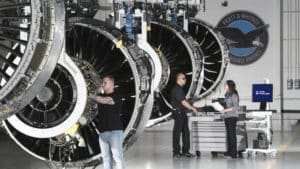
Workers at United Technologies subsidiary Pratt and Whitney work on a jet engine assembly line in this undated handout photo. Image courtesy of United Technologies.
To listen to all the corporate speak coming out of Raytheon and United Technologies over the past few days, you’d think one of the biggest mergers in New England history will involve all gain and no pain.
Shareholders will make a bundle, while everything else will be business as usual, with the combined company to keep the Raytheon name and its Massachusetts headquarters.
It will be a “merger of equals,” a claim undercut by the fact that United Technologies will own 57 percent of the shares, control the corporate board. Greg Hayes, United Technologies CEO, will also run the combined company.
But as always, you must look beyond the happy talk coming out of the corporate suites of the two defense giants to understand what’s really going on, for while there may be gain, at least in the short-term, there surely will be pain as well.
The Numbers Don’t Lie
There’s no better way to get a quick reality check than to look at the cold hard numbers that are one of the true drivers behind this deal.
The telling number is the $1 billion in “gross annual cost synergies.”
Where do you think Raytheon and United Technologies will turn in order to wring that billion-dollar plus in “cost synergies?”
If you had guessed layoffs and job cuts, you wouldn’t be half wrong.
The corporate line is the core businesses of the two companies don’t overlap, and that’s largely correct. United Technologies is an aerospace company making HVAC systems, jet engines and elevators, while Raytheon is a pure defense contractor, making missiles, radars and other high-tech systems.
Gain Access to New England Premier Source for Real Estate Data
Real estate is a moving target, but with a valuable tool like RE Records Search in your arsenal, you can get a bullseye every time. The Warren Group is New England’s premier source for timely and accurate real estate data, and RE Records Search provides valuable insight to the region’s property characteristics, tax records, sales and mortgage histories, and foreclosure information.
In their presentation to analysts and investors, executives at the two corporate behemoths spell out exactly where the cost savings will come from.
Roughly a third – $325 million – will come from “corporate and segment consolidation,” while $175 million will be wrung from “facilities consolidation.” A sizeable $150 million chuck will come from combining two different IT staffs, as well as sales and administrative units as well.
And execs at Raytheon and United Technologies believe they can squeeze another $350 million when the two companies’ supply chains and procurement systems are combined.
Will there be thousands of layoffs? Maybe not, but its strains credulity to claim this will be a bloodless merger, or more accurately, acquisition by United Technologies. They never are.
What Boston Wins, Western Mass. Loses
Still, on paper anyway, the Boston area will come out with most of the gains.
But the gains will not just come at Connecticut’s expense, with Gov. Ned Lamont lamenting the likely loss of 100 top executives to what will be the combined company’s new Massachusetts headquarters.
Western Massachusetts, where thousands of workers commute each day to work at United Technologies plants and businesses, may also take a hit as well, part of a larger pattern of jobs and wealth flocking to Boston and other major urban centers across the country.
Given we are talking about defense contracting that ultimately depends on federal spending, politics will also play a role who bears the brunt of the merger’s costs.
Sen. Charles Grassley, R-Iowa, a top power player in the Senate and a long-time critic of wasteful spending by the Pentagon, has said he’s received assurances from United Technologies that the combined company will be adding to, not subtracting from, its more than 9,000 jobs in his Midwestern state.
And you can bet he’s not the only member of Congress lobbying United Technologies and Raytheon executives to keep their home state jobs. Given Republicans still control many of the power levers in Washington, that puts blue states like Massachusetts and Connecticut at a disadvantage.
Maybe $1 billion in savings sounds like peanuts when you are talking about a combined company with revenues of more than $74 billion, but top execs at Raytheon and United Technologies would probably beg to differ given it is prominently displayed as one of the deal’s selling points.
And if it’s your life and livelihood on the line, those “cost synergies” are corporate doublespeak for job cuts and trouble ahead.
Scott Van Voorhis is Banker & Tradesman’s columnist; opinions expressed are his own. He may be reached at sbvanvoorhis@hotmail.com.






